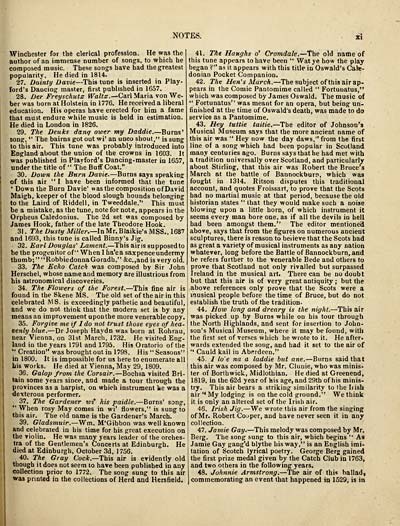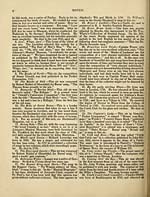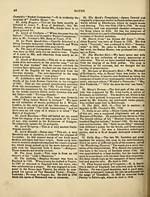Inglis Collection of printed music > Printed music > Hamilton's universal tune-book
(211) Page xi
Download files
Complete book:
Individual page:
Thumbnail gallery: Grid view | List view

NOTES.
Winchester for the clerical profession. He was the
author of an immense number of songs, to which he
composed music. These songs have had the greatest
popularity. He died in 1814.
27. Dainty Davie — This tune is inserted in Play-
ford's Dancing master, first published in 1657.
28. Der Freyschutz Waltz. ^ Carl Maria von We-
ber was born at Holstein in 1776. He received a liberal
education. His operas have erected for bim a fame
that must endure while music is held in estimation.
He died in London in 1826.
29. The Deuks danq ower my Daddie. — Burns'
song, " The bairns got out wi' an unco shout," is sung
to this air. This tune was probably introduced into
England about the union of the crowns in 1603. It
was published in Plavford's Dancing-master in 1657,
under the title of " The Buff Coat."
30. Down the Burn Davie. — Burns says speaking
of this air " I have been informed that the tune
* Down the Burn Davie' was the composition ofDavid
Maigh, keeper of the blood slough hounds belonging
to the Laird of Riddell, in Tweeddale." This must
be a mistake, as the tune, note for note, appears in the
Orpheus Caledonius. The 2d set was composed by
James Hook, father of the late Theodore Hook.
31 . The Dusty Miller.— -In Mr. Blaikie's MSS., 1687
and 1693, this tune is called Binny's Jig.
32. Earl Douglas' Lament. — This airis supposed to
be the progenitor of - ' When I ha'ea saxpenceundermy
thumb; ""Robbie donna Goradh." &c.,and is very old.
33. The Echo Catch was composed by Sir John
Herschel, whose name and memory are illustrious from
his astronomical discoveries.
34. The Flowers of the Forest.— This fine air is
found in the Skene MS. The old set of the air in this
celebrated MS. is exceedingly pathetic and beautiful,
and we do not think that the modern set is by any
means an improvement uponthe more venerable copy.
35. Forgive me if I do not trust those eyes of hea-
venly blue. — Dr Joseph Haydn was born at Rohrau,
near Vienna, on 31st March, 1732. He visited Eng-
land in the years 1791 and 1795. His Oratorio of the
" Creation" was brought out in 1798. His "Seasons"
in 1800. It is impossible for us here to enumerate all
Lis works. He died at Vienna, May 29, 1809.
36. Galop from the Corsair. — Bochsa visited Bri-
tain some years since, and made a tour through the
provinces as a harpist, on which instrument he was a
dexterous performer.
37. The Gardener wi' his paidle. — Burns' song,
■ When rosy May comes in wi' flowers," is sung to
this air. The old name is the Gardener's March.
39. Gladsmuir. — Wm. M'Gibbon was well known
and celebrated in his time for his great execution on
the violin. He was many years leader of the orches-
tra of the Gentlemen's Concerts at Edinburgh. He
died at Edinburgh, October 3d, 1756.
40. The Gray Cock.— This air is evidently old
though it does not seem to have been published in any
collection prior to 1772. The song sung to this air
was printed in the collections of Herd and Hersfield.
41. The Hattghs o' Cromdale. — The old name of
this tune appears to have been " Wat ye how the play
began ?" as it appears with this title in Oswald's Cale-
donian Pocket Companion.
42. The Hen's March. — The subject of this air ap-
pears in the Comic Pantomime called " Fortunatus,"
which was composed by James Oswald. The music of
" Fortunatus" was meant for an opera, but being un-
finished at the time of Oswald's death, was made to do
service as a Pantomime.
43. Hey tuttie taitie. — The editor of Johnson's
Musical Museum says that the more ancient name of
this air was " Hey now the day daws," from the first
line of a song which had been popular in Scotland
many centuries ago. Burns says that he had met with
a tradition universally over Scotland, and particularly
about Stirling, that this air was Robert the Bruce's
March at the battle of Bannockburn, which was
fought in 1314. Ritson disputes this traditional
account, and quotes Froissart, to prove that the Scots
had no martial music at that period, because the old
historian states " that they would make such a noise
blowing upon a little horn, of which instrument it
seems every man bore one, as if all the devils in bell
had been amongst them." The editor mentioned
above, says that from the figures on numerous ancient
sculptures, there is reason to beiieve that the Scots had
as great a variety of musical instruments as any nation
whatever, long before the Battle of Bannockburn, and
he refers further to the venerable Bede and others to
prove that Scotland not only rivalled but surpassed
Ireland in the musical art. There can be no doubt
but that this air is of very great antiquity ; but the
above references only prove that the Scots were a
musical people before the time of Bruce, but do not
establish the truth of the tradition.
44. How long and dreary is the night. — This air
was picked up by Burns while on his tour through
the North Highlands, and sent for insertion to John-
son's Musical Museum, where it may be found, with
the first set of verses which he wrote to it. He after-
wards extended the song, and had it set to the air of
" Cauld kail in Aberdeen."
45. / lo'e na a laddie but ane. — Burns said that
this air was composed by Mr. Clunie, who was minis-
ter of Borthwick, Midlothian. He died at Greenend,
1819, in the 62d year of his age, and 29th of his minis-
try. This air bears a striking similarity to the Iiista
air ''My lodging is on the cold ground." We think
it is only an altered set of the Irish air.
46. Irish Jig. — We wrote this air from the singing
of Mr. Robert Copper, and have never seen it in any
collection.
47. Jamie Gay. — This melody was composed by Mr.
Berg. The song sung to this air, which begins " As
Jamie Gay gang'd blythe his way," is an English imi-
tation of Scotch lyrical poetry. George Berg gained
the first prize medal given by the Catch Club in 1763,
and two others in the following years.
48. Johnnie Armstrong. — The air of this ballad,
commemorating an event that happened in 1529, is in
Winchester for the clerical profession. He was the
author of an immense number of songs, to which he
composed music. These songs have had the greatest
popularity. He died in 1814.
27. Dainty Davie — This tune is inserted in Play-
ford's Dancing master, first published in 1657.
28. Der Freyschutz Waltz. ^ Carl Maria von We-
ber was born at Holstein in 1776. He received a liberal
education. His operas have erected for bim a fame
that must endure while music is held in estimation.
He died in London in 1826.
29. The Deuks danq ower my Daddie. — Burns'
song, " The bairns got out wi' an unco shout," is sung
to this air. This tune was probably introduced into
England about the union of the crowns in 1603. It
was published in Plavford's Dancing-master in 1657,
under the title of " The Buff Coat."
30. Down the Burn Davie. — Burns says speaking
of this air " I have been informed that the tune
* Down the Burn Davie' was the composition ofDavid
Maigh, keeper of the blood slough hounds belonging
to the Laird of Riddell, in Tweeddale." This must
be a mistake, as the tune, note for note, appears in the
Orpheus Caledonius. The 2d set was composed by
James Hook, father of the late Theodore Hook.
31 . The Dusty Miller.— -In Mr. Blaikie's MSS., 1687
and 1693, this tune is called Binny's Jig.
32. Earl Douglas' Lament. — This airis supposed to
be the progenitor of - ' When I ha'ea saxpenceundermy
thumb; ""Robbie donna Goradh." &c.,and is very old.
33. The Echo Catch was composed by Sir John
Herschel, whose name and memory are illustrious from
his astronomical discoveries.
34. The Flowers of the Forest.— This fine air is
found in the Skene MS. The old set of the air in this
celebrated MS. is exceedingly pathetic and beautiful,
and we do not think that the modern set is by any
means an improvement uponthe more venerable copy.
35. Forgive me if I do not trust those eyes of hea-
venly blue. — Dr Joseph Haydn was born at Rohrau,
near Vienna, on 31st March, 1732. He visited Eng-
land in the years 1791 and 1795. His Oratorio of the
" Creation" was brought out in 1798. His "Seasons"
in 1800. It is impossible for us here to enumerate all
Lis works. He died at Vienna, May 29, 1809.
36. Galop from the Corsair. — Bochsa visited Bri-
tain some years since, and made a tour through the
provinces as a harpist, on which instrument he was a
dexterous performer.
37. The Gardener wi' his paidle. — Burns' song,
■ When rosy May comes in wi' flowers," is sung to
this air. The old name is the Gardener's March.
39. Gladsmuir. — Wm. M'Gibbon was well known
and celebrated in his time for his great execution on
the violin. He was many years leader of the orches-
tra of the Gentlemen's Concerts at Edinburgh. He
died at Edinburgh, October 3d, 1756.
40. The Gray Cock.— This air is evidently old
though it does not seem to have been published in any
collection prior to 1772. The song sung to this air
was printed in the collections of Herd and Hersfield.
41. The Hattghs o' Cromdale. — The old name of
this tune appears to have been " Wat ye how the play
began ?" as it appears with this title in Oswald's Cale-
donian Pocket Companion.
42. The Hen's March. — The subject of this air ap-
pears in the Comic Pantomime called " Fortunatus,"
which was composed by James Oswald. The music of
" Fortunatus" was meant for an opera, but being un-
finished at the time of Oswald's death, was made to do
service as a Pantomime.
43. Hey tuttie taitie. — The editor of Johnson's
Musical Museum says that the more ancient name of
this air was " Hey now the day daws," from the first
line of a song which had been popular in Scotland
many centuries ago. Burns says that he had met with
a tradition universally over Scotland, and particularly
about Stirling, that this air was Robert the Bruce's
March at the battle of Bannockburn, which was
fought in 1314. Ritson disputes this traditional
account, and quotes Froissart, to prove that the Scots
had no martial music at that period, because the old
historian states " that they would make such a noise
blowing upon a little horn, of which instrument it
seems every man bore one, as if all the devils in bell
had been amongst them." The editor mentioned
above, says that from the figures on numerous ancient
sculptures, there is reason to beiieve that the Scots had
as great a variety of musical instruments as any nation
whatever, long before the Battle of Bannockburn, and
he refers further to the venerable Bede and others to
prove that Scotland not only rivalled but surpassed
Ireland in the musical art. There can be no doubt
but that this air is of very great antiquity ; but the
above references only prove that the Scots were a
musical people before the time of Bruce, but do not
establish the truth of the tradition.
44. How long and dreary is the night. — This air
was picked up by Burns while on his tour through
the North Highlands, and sent for insertion to John-
son's Musical Museum, where it may be found, with
the first set of verses which he wrote to it. He after-
wards extended the song, and had it set to the air of
" Cauld kail in Aberdeen."
45. / lo'e na a laddie but ane. — Burns said that
this air was composed by Mr. Clunie, who was minis-
ter of Borthwick, Midlothian. He died at Greenend,
1819, in the 62d year of his age, and 29th of his minis-
try. This air bears a striking similarity to the Iiista
air ''My lodging is on the cold ground." We think
it is only an altered set of the Irish air.
46. Irish Jig. — We wrote this air from the singing
of Mr. Robert Copper, and have never seen it in any
collection.
47. Jamie Gay. — This melody was composed by Mr.
Berg. The song sung to this air, which begins " As
Jamie Gay gang'd blythe his way," is an English imi-
tation of Scotch lyrical poetry. George Berg gained
the first prize medal given by the Catch Club in 1763,
and two others in the following years.
48. Johnnie Armstrong. — The air of this ballad,
commemorating an event that happened in 1529, is in
Set display mode to: Large image | Transcription
Images and transcriptions on this page, including medium image downloads, may be used under the Creative Commons Attribution 4.0 International Licence unless otherwise stated. ![]()
| Special collections of printed music > Inglis Collection of printed music > Printed music > Hamilton's universal tune-book > (211) Page xi |
|---|
| Permanent URL | https://digital.nls.uk/94522788 |
|---|
| Description | Scottish and English songs, military music and keyboard music of the 18th and 19th centuries. These items are from the collection of Alexander Wood Inglis of Glencorse (1854 to 1929). Also includes a few manuscripts, some treatises and other books on the subject. |
|---|
| Description | The Glen Collection and the Inglis Collection represent mainly 18th and 19th century Scottish music, including Scottish songs. The collections of Berlioz and Verdi collected by bibliographer Cecil Hopkinson contain contemporary and later editions of the works of the two composers Berlioz and Verdi. |
|---|

